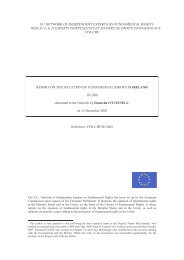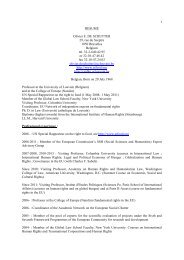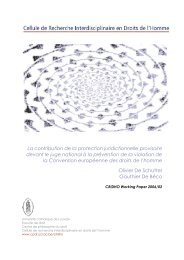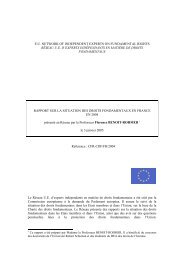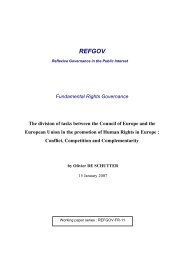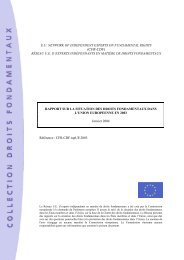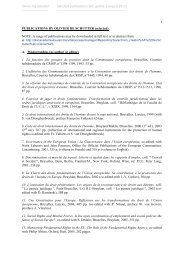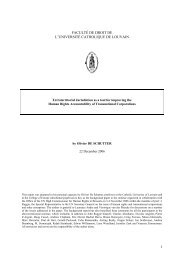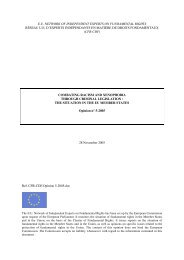The Prohibition of Discrimination under European Human ... - cridho
The Prohibition of Discrimination under European Human ... - cridho
The Prohibition of Discrimination under European Human ... - cridho
Create successful ePaper yourself
Turn your PDF publications into a flip-book with our unique Google optimized e-Paper software.
thematic report<br />
■ THE PROHIBITION OF DISCRIMINATION UNDER EUROPEAN HUMAN RIGHTS LAW ■<br />
<strong>The</strong> 1950 <strong>European</strong> Convention on <strong>Human</strong> Rights (ECHR) is in force in all the Member States <strong>of</strong> the Union and<br />
binds them even in situations where they are implementing Union law. It contains a large range <strong>of</strong> civil <strong>of</strong> political<br />
rights, including the right to life, the prohibition <strong>of</strong> torture and <strong>of</strong> inhuman or degrading treatment or punishment,<br />
the prohibition <strong>of</strong> slavery and forced labour, the right to liberty and security, the right to a fair trial, the principle <strong>of</strong><br />
no punishment without law (nullum crimen, nulla poena sine lege), the right to respect for private and family life,<br />
freedom <strong>of</strong> thought, conscience and religion, freedom <strong>of</strong> expression, freedom <strong>of</strong> assembly and association, and the<br />
right to marry. Additional protocols to the ECHR guarantee rights such as the protection <strong>of</strong> property, the right to<br />
education, the right to free elections (Protocol n°1), the prohibition <strong>of</strong> imprisonment for debt, freedom <strong>of</strong><br />
movement, the prohibition <strong>of</strong> expulsion <strong>of</strong> nationals and the prohibition <strong>of</strong> collective expulsion <strong>of</strong> aliens (Protocol<br />
n°4), the abolition <strong>of</strong> the death penalty (Protocol n°6 and, extending the prohibition to times <strong>of</strong> war, Protocole<br />
n°13), the procedural safeguards relating to the expulsion <strong>of</strong> aliens, the right <strong>of</strong> appeal in criminal matters, the right<br />
to compensation for wrongful conviction, the right not to be tried or punished twice, or equality between spouses<br />
(Protocol n°7).<strong>The</strong> enjoyment <strong>of</strong> all these substantive rights must be ensured without discrimination, <strong>under</strong> Article<br />
14 ECHR to which the later additional protocols refer. In order to explain what the ECHR may contribute to the<br />
implementation and interpretation <strong>of</strong> the Directives adopted on the basis <strong>of</strong> Article 13 EC, this section examines<br />
the substantive content <strong>of</strong> the requirement <strong>of</strong> non-discrimination <strong>under</strong> Article 14 ECHR and Article 1 <strong>of</strong> Protocol<br />
n°12 ECHR (1.). It then examines the scope <strong>of</strong> application <strong>of</strong> the non-discrimination clause contained in Article 14<br />
<strong>of</strong> that instrument (2.), and the extension <strong>of</strong> the requirement <strong>of</strong> non-discrimination by Protocol n°12 additional to<br />
the Convention, which has been opened for signature on 4 November 2000, and shall enter into force on 1 April<br />
20057 (3.).<br />
7<br />
On 24 December 2004, 11 States parties to the ECHR had ratified Protocol n°12. Of the 25 EU Member States however, only the Netherlands,<br />
Cyprus and Finland have ratified the Protocol at this date.<br />
12



